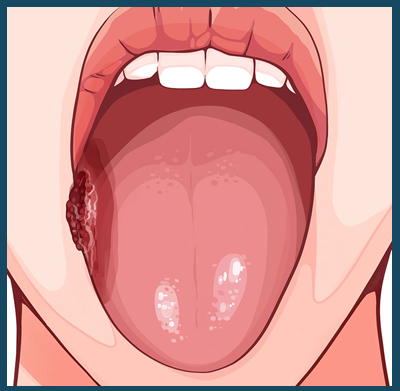

Tongue cancer is a form of cancer that begins in the cells of the tongue.
Several types of cancer can affect the tongue, but tongue cancer most often begins in the thin, flat squamous cells that line the surface of the tongue. The type of cells involved in tongue cancer helps determine prognosis and treatment.
In the throat, at the base of the tongue, where tongue cancer may develop with few signs and symptoms (hypopharyngeal tongue cancer). Cancer at the base of the tongue is usually diagnosed at an advanced stage, when the tumor is larger and the cancer has spread into the lymph nodes in the neck.
Increasingly, cancers at the base of the tongue are associated with human papillomavirus (HPV), which has a profound effect on the prognosis and treatment of the cancer.
Tongue cancer is classified using stages and grades. The stage indicates how far the cancer has spread. Each stage has three potential classifications:
The grade of the cancer refers to how aggressive it is and how likely it is to spread. Tongue cancer can be:
In the early stages of tongue cancer, especially with cancer at the base of the tongue, you might not notice any symptoms. The most common early symptom of tongue cancer is a sore on your tongue that doesn’t heal and that bleeds easily. You might also notice mouth or tongue pain.
Other symptoms of tongue cancer include:
The cause of tongue cancer is unknown. However, certain behaviors and conditions can increase your risk, including:
Tongue cancer is also more common in older men than in women or younger people. Oral cancers are most common in people over 55 years old.
To diagnose tongue cancer, your doctor will first take a medical history. They’ll ask you about any family or personal history of cancer, whether you smoke or drink and how much, and if you’ve ever tested positive for the HPV virus. Then they’ll do a physical examination of your mouth to look for signs of cancer, such as unhealed ulcers. They’ll also examine nearby lymph nodes, to check for swelling.
If your doctor sees any signs of tongue cancer, they’ll do a biopsy of the area of suspected cancer. An incisional biopsy is the most frequently used type of biopsy. In this type of biopsy, your doctor will remove a small piece of the suspected cancer. This is usually done under local anesthesia in your doctor’s office.
Instead of an incision biopsy, your doctor might do a newer type of biopsy called a brush biopsy. In this biopsy, they’ll roll a small brush over the area of suspected cancer. This causes minor bleeding and allows your doctor to collect cells for testing.
Homeopathy is one of the most popular holistic systems of medicine. The selection of remedy is based upon the theory of individualization and symptoms similarity by using holistic approach. This is the only way through which a state of complete health can be regained by removing all the sign and symptoms from which the patient is suffering. Tongue cancer treatment that can be selected on the basis of cause, location, sensation, modalities and extension of the complaints. Some important remedies are given below for Tongue cancer treatment:
KALI CYNATUM —Kali cynatum is one of the most effective remedy for tongue cancer. It is usually indicated in the last stage of cancer with severe pain. Ulcer of tongue with indurated edges, especially right side of tongue. Speech difficult, the power of speech lost but intelligence intact. Tongue has a peculiar dark ground seen through heavy white coating. Lips and mucuous membrane of mouth becomes pale , and slight frothing is seen at the mouth.
ARSENICUM ALBUM —Arsenic album is indicated for cancer tongue with much burning and dryness. Tongue dry, clean and red, stitching and burning pain in tongue, ulcerated and bluish white. Edges of tongue red, takes imprint of teeth. Along with this the peculiar mental symptom of Arsenic is seen. Great restlessness, anguish and fear of death and disease.
CHROMIC ACID —Chromic acid is indicated for cancer tongue with foul smelling breath. Inflammation and destruction of epithelium and mucous membrane.
CROTALUS HORRIDUS —Crotalus hor is prescribed for cancer tongue with fetid breath, peculiar moldy smell from mouth. Hemorrhage dark blood , which is not clotted. Mouth fills up with bloody, frothy saliva.
GALIUM APARINE —Galium aparine is indicated for cancerous ulcers and nodulated tumors of tongue. Favors healthy granulations on ulcerated surfaces.
CITRUS LIMON —Citrus limon has relieved the pain of the cancer tongue. It is also used as a mouth wash.
SEMPERVIVUM TECTORUM —Sempervivum tectorum is considered a specific remedy for tongue cancer. Indurations and sores on the tongue with stabbing pain. Whole mouth is very tender and sensitive. Tongue is ulcerated and bleed easily, especially at night.
VIBURNUM PRUNIFOLIUM —Cancer of the tongue.e.t.c